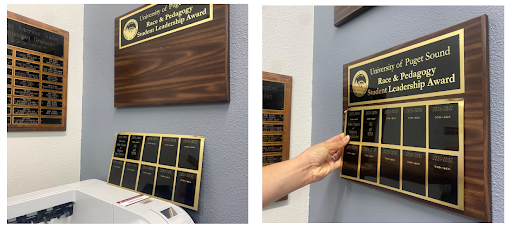
By Jack Leal
On April 8, the Race and Pedagogy Student Leadership Award plaque in the African American studies (AFAM) department was forcibly removed and damaged by vandalism. This followed another incident that occurred the second week of February when a poster promoting an event organized by the School of Education was also vandalized.
The investigation into the vandalism remains open. Director of Security Services Dr. Dave Ferber declined to comment due to its ongoing nature. The culprit has not been identified. Vice President of Institutional Equity and Diversity Lorna Hernandez Jarvis said, “I’m hesitant to say that we know it’s absolutely targeted, because we don’t know. It was an anonymous act of vandalism, so that’s the first thing.”
Still, despite the uncertainty of the perpetrators’ intent, this incident has left AFAM faculty and Race and Pedagogy Institute (RPI) leaders feeling unsettled and targeted. In an email to campus, Hernandez Jarvis wrote, “The open-door policy of the RPI and AFAM office suite, meant to signal welcome and accessibility, has been violated, leaving students and faculty feeling vulnerable and attacked.”
Hernandez Jarvis has been meeting with departments and planners to discuss how to respond to these events and reaffirm what the University stands for. “We denounce this; this is not who we are, and yes, we can talk about it institutionally, but individually, it’s really challenging those individuals who are being attacked,” she said.
Skya Favor (‘26), a gender and queer studies major with a minor in African American studies, works as a Race and Pedagogy Program Assistant in the RPI and AFAM office suite. She was among the first students to discover the vandalism. “I came in the next day and just heard what was going on – everyone was abhorred,” Favor said. She emphasized the University’s responsibility in the matter: “I think the University needs to stand up and take a side on what they believe in.” She added, “They need to do something to make the communities who are most affected by everything going on feel safe before anything else.”
Hernandez Jarvis recommended that our community members, first and foremost, “be aware and be sure that we’re helping those who are being targeted. Be aware when they put up events that are trying to share their culture or address these problems, show up! And engage in the dialogue, engage in the conversations!” she said.
Looking forward, Favor encourages communal solidarity on campus, insisting the campus “protect our spirit and just have hope, we have to come together and have to realize, we’re all in this together, we’re all in this fight together, and that although this happened, and it’s absolutely disgusting, it’s not over, we’re not done.”
While the intent behind this act of vandalism was unclear, Hernandez Jarvis stressed that the attacks are damaging regardless. “They’re acts of harm. The one other aim is to create a sense of fear, a sense of uncertainty,” Hernandez Jarvis said. She explained her motivation for sending out the email, saying it was important to convey: “Hey, we’re not fearful.”
This incident has raised questions about campus security. Hernandez Jarvis said that increasing policing might have unintended consequences. “When you talk about a particular group of members of our community that historically had been targeted or feel over-policed, that is a problem,” Hernandez Jarvis said. “We can, in some ways, increase the security. There are different ways in which that can be done, but does that make them actually feel safer?” she asked.
Favor echoed these concerns, noting that “although the intention might be pure, it always ends up targeting and affecting marginalized groups most.” She added, “although surveillance might increase, our safety is put more at risk because we’re actually not the ones to be protected by that extra amount of surveillance.”
